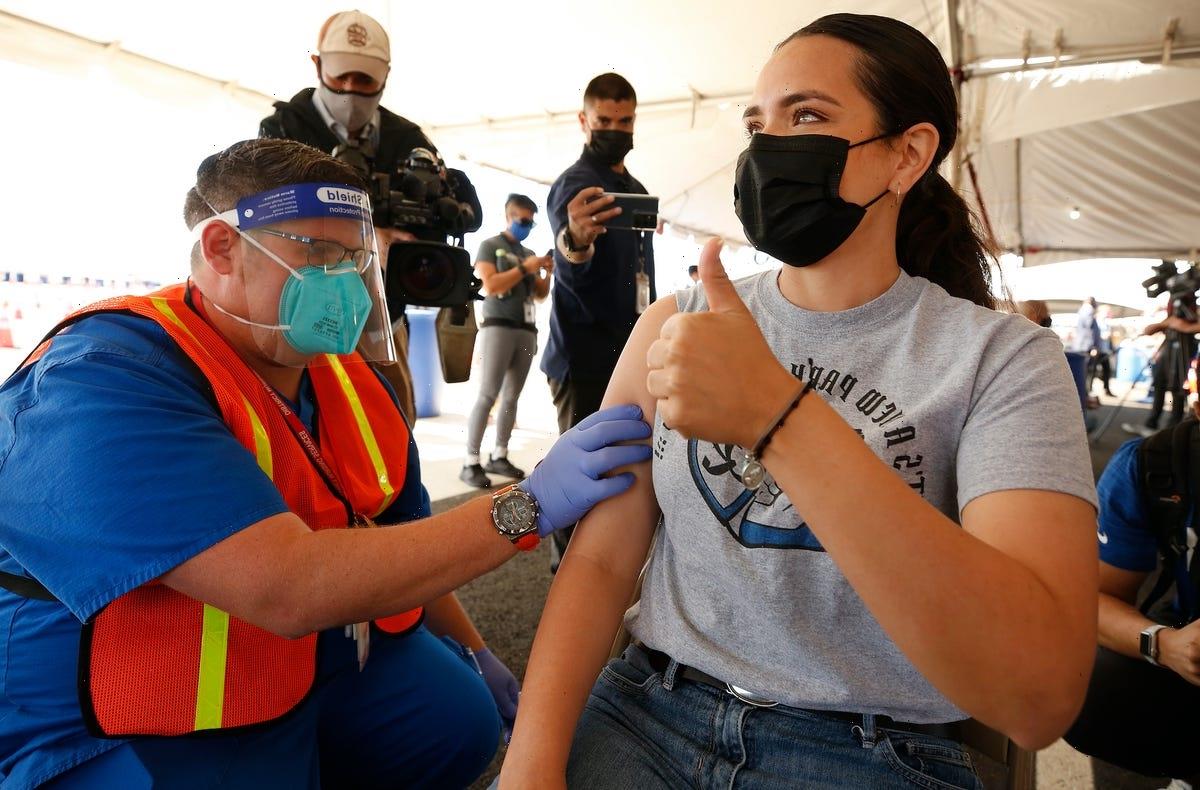- Your age, sex, and health status can affect your odds of developing side effects after a COVID-19 shot.
- Young people are likely to have strong immune responses, which can cause unpleasant reactions.
- Insider spoke with people in their teens, 20s and 30s about their side effects.
- See more stories on Insider’s business page.
Shoshannah Buxbaum, 30, said she felt pain in every single one of her joints the day after she got her second dose of the Pfizer COVID-19 vaccine.
“I’m sitting at the kitchen table with my mom and I just can’t keep my head up,” she told Insider about 22 hours after her shot.
Buxbaum also felt nauseous and tired the day after her second dose, and a lifetime of chronic hip pain may have exacerbated her joint pain post-vaccine. She told Insider she took to her bed for the rest of the day. By the next morning, she had fully recovered.
Young adults have gotten a reputation for being relatively symptom-less throughout the pandemic. They’re more likely to have asymptomatic infections, which can drive case rates up for the rest of the population.
But when it comes to vaccine reactions, young people are just as likely — if not more so — to experience side effects compared to older adults. Insider spoke with people in their teens, 20s and 30s about how they felt post-vaccine.
Young people have stronger immune responses, which can cause side effects
People in their 20s and 30s may have more intense side effects compared to older folks. That’s because our immune systems gradually deteriorate with age, experts previously told Insider.
“Younger individuals have a much more vigorous immune response, so it should make sense that they would also have more side effects,” Dr. Vivek Cherian, an internal-medicine physician in Baltimore, told Insider’s Aria Bendix.
However, that’s not to say the severity of your side effects correlates with the strength of your immune system. Elderly people have reported flu-like reactions similar to those experienced by young adults, and many young people only have mild arm pain after their shots.
After the first shot of Pfizer or Moderna, flu-like symptoms and arm pain
Kelly Carton, 27, experienced a couple days of arm tenderness after her first Pfizer shot. Carlton’s reaction is typical of what many people experience after their first dose of the Pfizer and Moderna COVID-19 vaccines.
Rachel Flannery, also 27, experienced a similar reaction: two days of a sore arm after her first Pfizer shot.
Rachel Greenspan, a 24-year-old digital culture reporter at Insider, got Moderna’s COVID-19 vaccine. After her first shot, Greenspan said, she had a bit of nausea and fatigue along with arm pain.
Mia de Graaf, 29, senior health editor at Insider, barely experienced any side effects until a week after her first Moderna shot, when she got so-called “Moderna arm” — a slightly hot, red patch at the injection site, which faded within two days.
The second shot of Pfizer or Moderna typically carries more intense side effects
Most people will experience a more severe reaction after the second shot — in Pfizer trials, about twice as many participants developed chills and joint pain after their second dose than after their first. In Moderna’s trial, roughly five times as many participants developed chills after their second dose as did after their first.
The day after Flannery’s second Pfizer shot, she had aches and pains. She told Insider she had “terrible joint and bone pain, dizziness, headache, and arm pain” that came on about 16 hours after the injection.
Greenspan felt like “every muscle in my body was sore” about three hours after getting her second Moderna shot. Twelve hours after the injection, she woke up with a fever, chills, nausea, and a pounding headache — none of which surprised her after hearing about reactions her friends had.
But she was caught off guard when she vomited the next morning.
“That’s when I knew I needed the day off,” she said.
People who got the J&J shot may also have flu-like reactions
Some people who got the single-dose Johnson & Johnson vaccine reported reactions after the sole shot.
Christian Mendonca, 34, previously told Insider he felt tired, cold, and ran a fever for 12 hours after getting his J&J vaccine.
Manny Fidel, 29, a columnist and editor at Insider, also felt feverish the night of his J&J shot, although he didn’t check his temperature. He said he started feeling ill around 7pm and was bedridden for 18 hours with aches, chills, nausea, and a racing heart rate.
Some people reported more severe or extended reactions
Chloe Kathuria, 18, told Insider she had a particularly unpleasant reaction to the J&J shot. She was up all night feeling freezing cold, and her shivers made her muscle aches even worse. She ran a fever for two days, but the soreness in her arm and body lasted a week,
Kathuria, like many others who experience side effects, took a day off from class after getting her shot. Her reaction was on the more severe end of the spectrum — but getting vaccinated was still worth it.
“Two days of a fever is better than having the coronavirus and being hospitalized,” she told Insider.
While Kathuria didn’t expect to feel so ill after her shot, others braced themselves for side effects. Jes Adams, 35, previously told Insider she has some preexisting medical conditions and a history of reacting strongly to vaccinations.
Adams said she spent much of the day after her second Moderna shot bedridden with dizziness and vomiting. Luckily, she had planned ahead to take the day off and recovered quickly.
Source: Read Full Article
